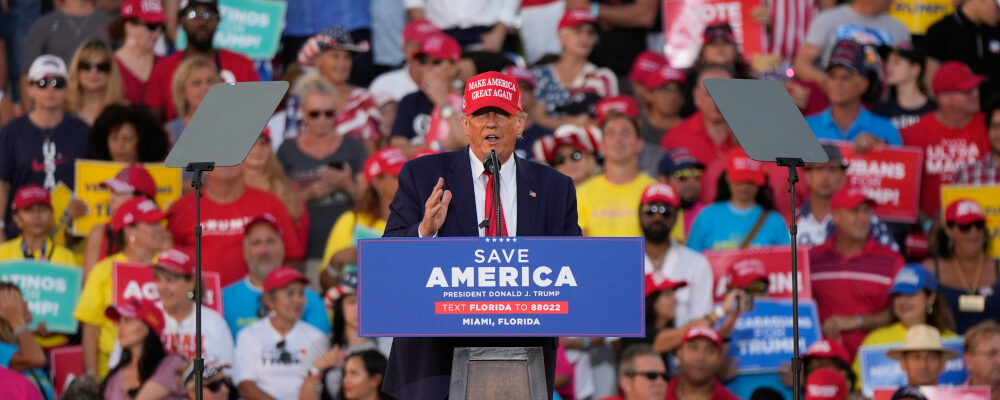Review of: Confidence Man: The Making of Donald Trump and the Breaking of America
Author: Maggie Haberman
Publisher: Penguin Press, 2022
New York Times columnist Roger Cohen once said that living with Trump as president was like living in a totalitarian state. Life with Trump was all-consuming, just like the Castros in Cuba, the Kims in North Korea, the Ayatollahs in Iran, and Putin in Russia. Your day is consumed thinking about one person and one person only. Donald Trump consumed our attention for the whole of his presidency and two years after he left office, yet he refuses to let go. Yes, he’s still around, but he is diminishing in our thoughts and slowly vanishing. He doesn’t scare us anymore because he has lost his power. Now he’s all bluster, panic, and desperation. This is not a good time to be Donald Trump.
When New York Times journalist Maggie Haberman wrote Confidence Man, my first thought was, what could she possibly tell us that we don’t already know following the flood of books during Trump’s presidency? In reading her book, her intention wasn’t to come up with anything new but to document Trump’s character, methodically, before and after his presidency. A person she describes as insecure, vindictive, lonely, pugnacious, and addicted to television, with little interest in his country other than seeking its love and approval. This book was written for posterity, not to educate about someone we know so well.
Nothing mattered but that people loved and worshipped him. But to con his countryman, he had another side, one more sympathetic. Haberman describes the Good Trump as “funny and fun to be around [and] capable of generosity and kindness.” In the end, Bad Trump was never far away, interested only in money, bullying, dominance, and fame, the drug that drove him every day. Trump measured his life by comparing his success to others. He had to be the richest, the smartest, and the one with the most beautiful woman. In one instance, he pulls former New York governor Mario Cuomo out of a club to show off his new conquest sitting in the back of his limo. Without introducing her, he said to Cuomo, “She’s a perfect 10.” It was the model, Marla Maples. Like a child, he had to show off his new toy that was better than yours. Trump never grew up. Harvard political theorist Harvey Mansfield describes Trump’s unabashed display of “manly vulgarity” and the ease he gets away with it.
At heart, he’s also cowardly. Though his TV catchphrase was “You’re fired”, he had others do the dirty work. Trump wanted his daughter Ivanka and son-in-law Jared Kushner fired but wanted his chief of staff, General John Kelly, to deliver the bad news. And it wasn’t the power of the presidency that appealed. Trump wanted loyalty but without reciprocity. He demanded that his generals—in a show of extraordinary ignorance—be more like German generals under Hitler. After serving 18 months, four-star general John Kelly resigned. He described Trump as a “fascist” with no interest in history and unfit to lead a constitutional democracy.
Other than his own, the hard work of policy and ideas held no interest in Trump’s imagination. He only craved love from massive crowds who came to adore him. When British Prime Minister Theresa May visited Trump at the White House after her victory, she could hardly get Trump to focus on issues. All he wanted to talk about were the crowds at his inauguration. He didn’t even know American U.S. troops couldn’t be deployed on American soil. The Constitution was something to be negotiated away if the price was right. In the traditional briefing with President Obama after the election, Trump showed no interest in matters of state but wanted to know how his predecessor kept his approval ratings so high. Some saw Trump’s crush on Putin as a tactic to move Russia away from China. His character belies that intention. It is easier to believe his motives were financial rather than geopolitical.

Confidence Man carefully documents Trump’s life, his dependency on his father’s wealth, and his rise to fame despite the relatively few business successes and enormous losses, particularly in gaming. Yet he persisted; his once movie-star good looks managed to swing massive bank loans and generous government programs that kept his businesses afloat. It was the one talent he possessed; to con the rich and those who wanted to be rich. How else can one understand the idiocy of Trump University? One had to admire how he turned his name into a paying commodity with outsized ambitions but small-bore business skills. He had little use for the law or following rules other than to tie up his opponents in litigation for years. Others were richer, but he kept up the fantasy of success and fame to the point of deceiving his way into the Forbes list of wealthiest people.
Then he landed his dream job on The Apprentice, which brought him money and fame with the illusion that he was a business genius. As one voter said, “he’s a successful businessman; I saw him on television.” For many, Trump’s vulgarity wasn’t a defect but an asset. It meant he was one of the hoi polloi who hated those with high social standing. He both disdains and envies their education and intelligence while belittling them any chance he gets. Reading Haberman’s book, it’s shocking that Trump avoided jail time, given the corruption in his organization and New York’s real estate business. As president, Trump wasn’t there to reform the system but to bend it to his will and benefit.
As Haberman reminds us, “he reoriented an entire country to react to his moods and emotions.” I would add, and a good part of the world. As pundit Jonah Goldberg said of Trump, his talent was to corrupt serious people and attract seriously corrupt people. In the end, democracy wasn’t subverted, and the rule of law survived. The drama isn’t over. The courts will have the final say in the coming year.




